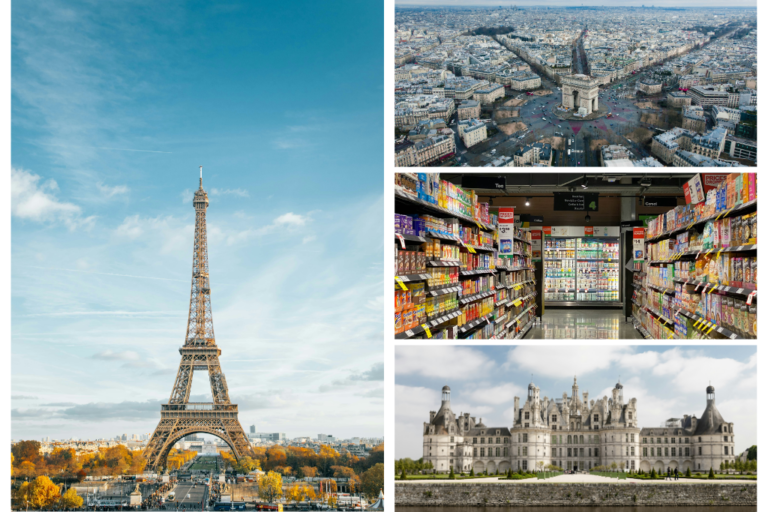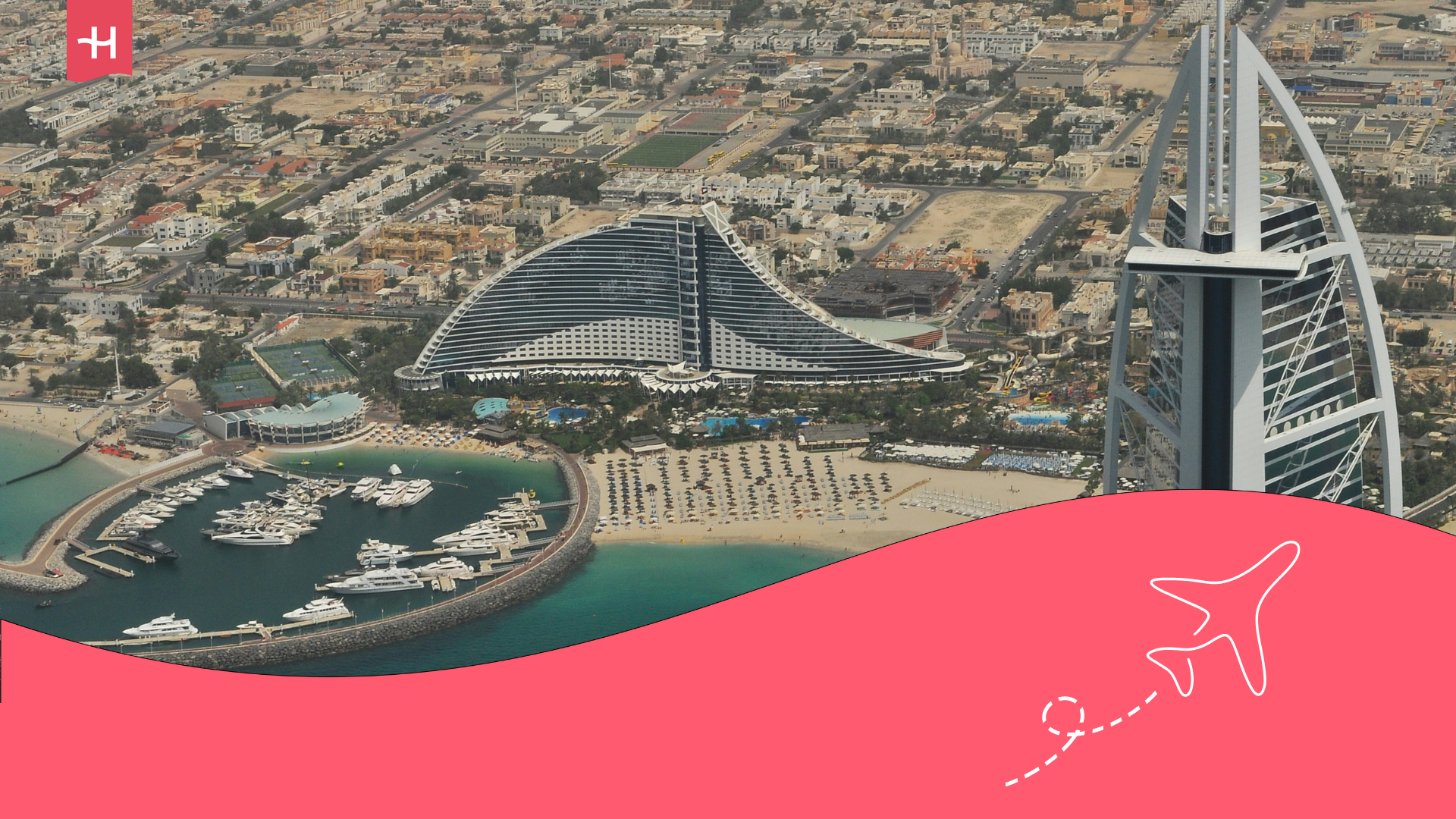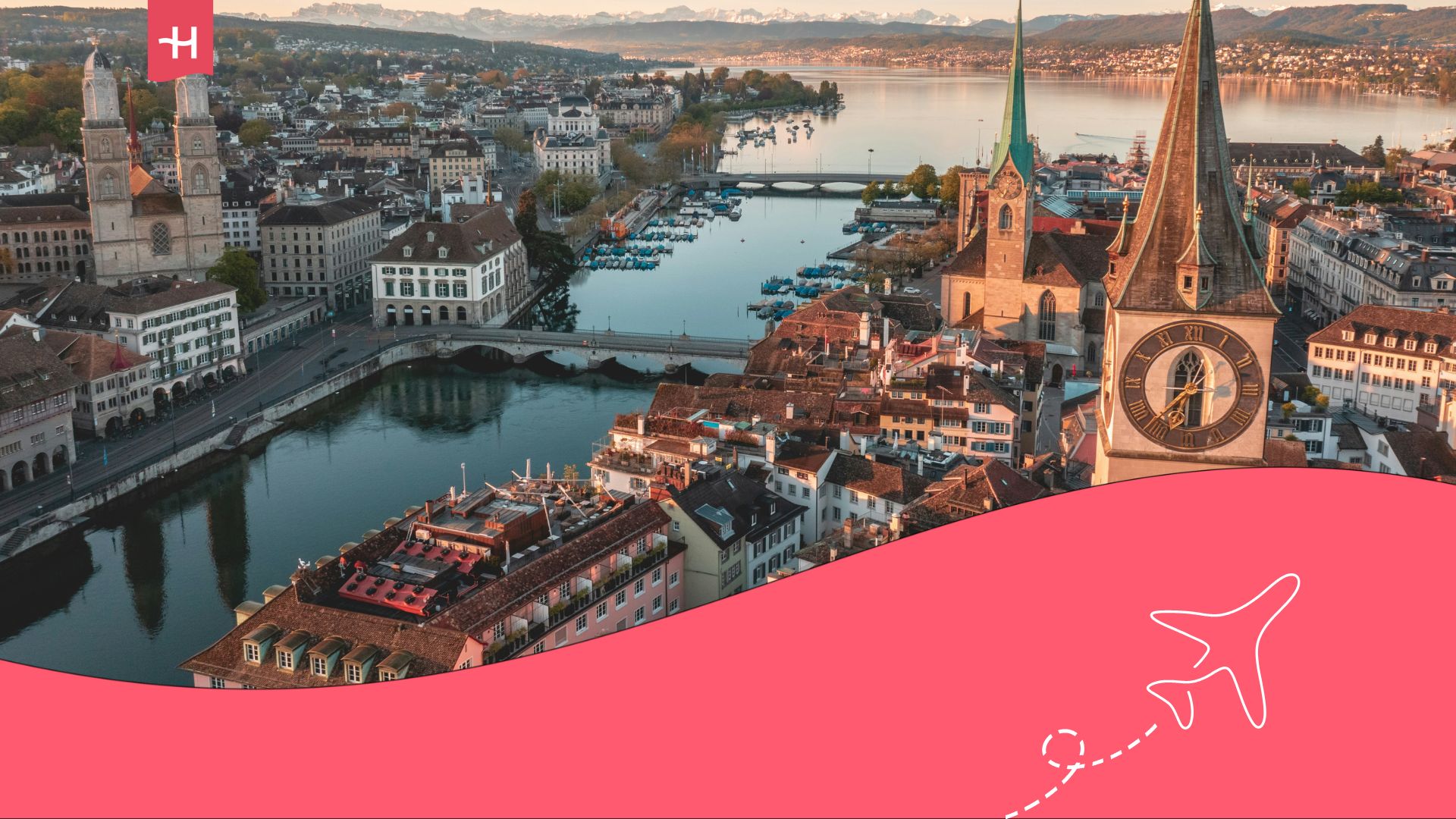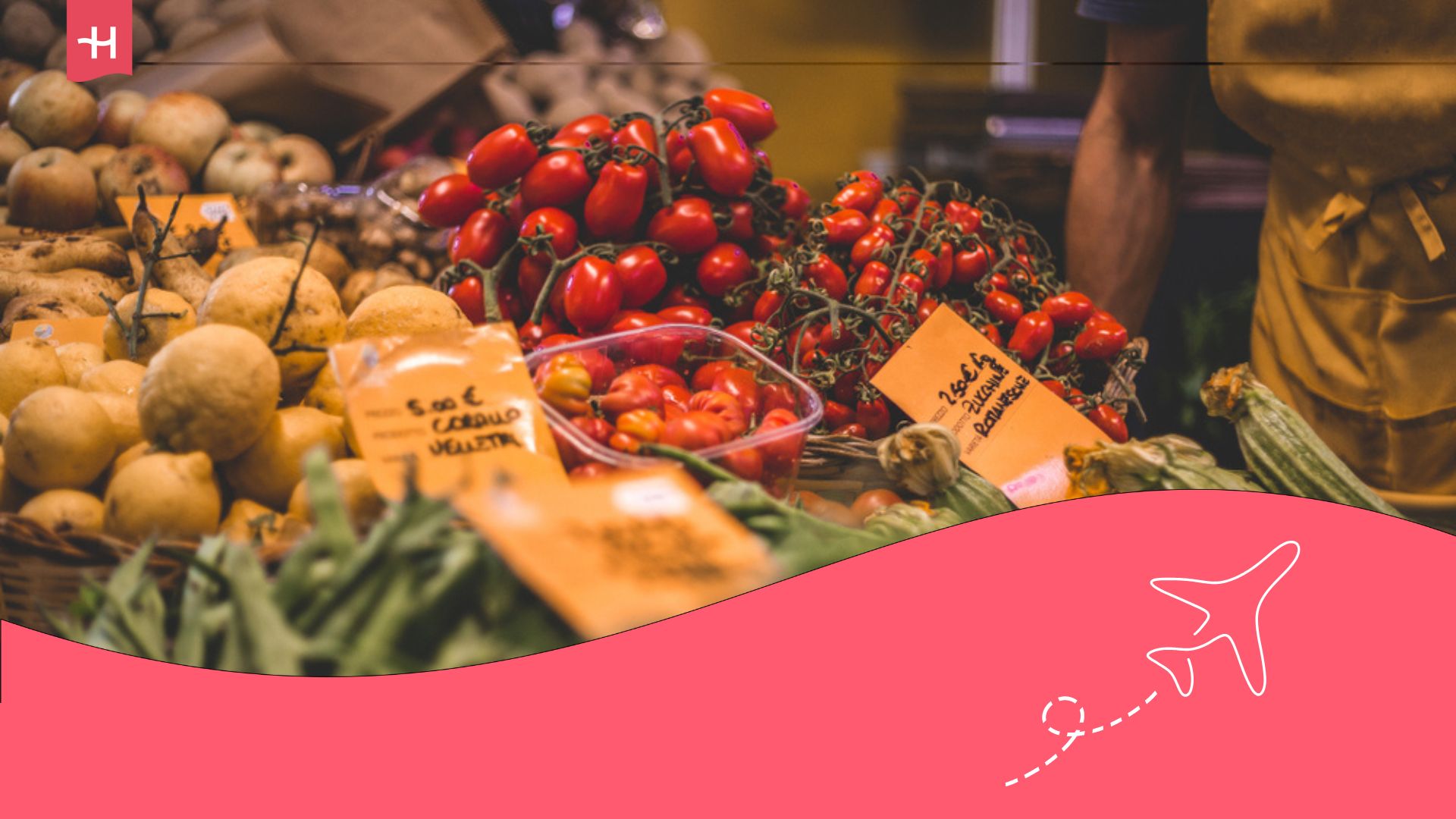Best supermarkets in France: Where to go grocery shopping?
Discover the best supermarkets in France: prices, opening hours, and options to make your shopping easy and affordable.
Moving to France brings plenty of new experiences, and one of the most important for everyday life is knowing where to shop. French supermarkets range from large chains that have everything in one place to smaller local stores where freshness and regional products really stand out.
In this article, we’ll highlight the best supermarkets in France, with options to suit different lifestyles and budgets. Whether you want to save money, hunt for gourmet products, or simply make your shopping easier, this guide will help you navigate French supermarkets like a local.
What types of stores are there in France?
To tell you about the different types of supermarkets in France, let’s start with the most common formats and how to use them to your advantage:
- Hypermarkets: These are large stores, usually located on the outskirts, where you can find just about everything in one place, including food, clothing, appliances and even furniture. They are ideal for doing your biggest weekly shop.
- Neighborhood supermarkets: These are smaller than hypermarkets but still have everything you need for your regular shopping. They are convenient because they are usually located in residential areas and easy to reach without a car.
- Local stores: These are perfect for when you need something quickly at home. They usually stay open late and focus more on convenience than on variety or price.
- Traditional grocery stores: These are very small, family-run shops where you can pick up the essentials. The best part is the friendly service and the neighborhood feel.
- Discount stores: Chains like Lidl and Aldi are very popular for their low prices and good-quality basic products. They are a great choice if you want to save money.
- Specialty stores: These types of stores are very common in France. For example, Picard specializes in frozen foods, Biocoop and Naturalia focus on organic products, and Grand Frais is the place to go for fresh produce, including fruits, vegetables, and local cheeses.
- Local markets: Whether open-air or covered, these markets are the perfect place to soak up the French atmosphere, discover regional products, and enjoy a stroll while you shop.
- Online shopping and pickup: This practice is becoming more and more popular. You place your order online and then pick it up by car or on foot, which saves a lot of time during busy weeks.
Best supermarkets in France
Now that you are familiar with the different types of stores in France, it’s time to get to know the major chains. Each supermarket has its own strengths: some stand out for low prices, others for the quality of their fresh products or their convenient locations. Below, we take a look at the most notable supermarkets in France and what you can expect from each.
E.Leclerc
E.Leclerc started in the 1940s as a cooperative of independent shopkeepers and is now the most popular supermarket chain in France. Its philosophy has always been simple: keep prices low without sacrificing variety.
At this supermarket in France, you’ll find everything from popular brands to their own product ranges. Eco+ covers the cheapest options, Marque Repère offers a good balance of quality and price, and Bio Village focuses on organic products. They also highlight local producers, which shows in their fresh fruits, vegetables, and French cheeses.
Leclerc is often considered the cheapest of the major supermarket chains. For example, a 6-liter pack of milk costs around $6.45, while rival chains can be 30 to 40 cents more. A basic baguette is about $1.15, similar to other stores, but their Eco+ line usually offers the lowest prices on staples like pasta or rice.
Leclerc also has over 700 hypermarkets and supermarkets, along with nearly as many locations for picking up online orders. If you live in a medium or large city, there’s likely a Leclerc nearby. They are open Monday to Saturday, usually until 8 or 9 pm, and many also open Sunday mornings until 1 pm, depending on local regulations.
| Advantages | Disadvantages |
| Generally the best prices in large retail chains | Very busy stores at peak times |
| Extensive national network and convenient drive-through service | Location on the outskirts in many cases (you need a car) |
| Varied and competitive own brands | Less “premium” experience compared to other chains |
Carrefour
Carrefour is a global giant and in France it comes in every format: hypermarkets, Carrefour Market, Carrefour City, and Express. This means you can find it both on the outskirts and right in the city center.
It offers a wide variety of products, high-quality fresh items, and well-regarded private labels like Carrefour Bio. They also have controlled origin programs to ensure traceability for meat, fruits, and vegetables.
Carrefour is usually not the cheapest option. In 2025 studies, it ranks behind Leclerc and Intermarché, and is more expensive than Lidl for basic items. For example, a standard baguette costs around $1.16, and Carrefour Classic pasta is about $1.99–2.10 per kilogram.
Carrefour has more than 1,000 Carrefour Market locations across France, in addition to its hypermarkets and convenience stores. You can usually find at least one Carrefour in any city. The stores are quite spacious, especially in urban areas, and many are open on Sunday mornings until 1 pm.
| Advantages | Disadvantages |
| Wide variety of formats: there is always one nearby | Average basket slightly more expensive than Leclerc |
| Varied own brands (including Carrefour Bio) | Prices vary depending on format and city |
| Good promotions and loyalty programs | Outlying hypermarkets may be far from the city center |
Important: If you are a frequent traveler and want to stay connected without worrying about expensive roaming or looking for a new SIM at every destination, Holafly’s subscription plans are for you. With a single eSIM, enjoy internet in more than 170 countries for a fixed price and no surprises on your bill. Travel without limits and connect easily and securely! 🚀🌍

Intermarché
Intermarché is part of the Les Mousquetaires group and promotes a very French idea: “producers and merchants.” This reflects how the chain operates, with its own factories producing many of its brands, giving them more control over quality and prices. Their offerings include Pâturages dairy and a wide range of French products, from fresh to processed, emphasizing their local roots and customer-focused approach.
When it comes to prices, Intermarché is usually on par with Leclerc, making it one of the more affordable options among France’s major supermarkets. A six-liter pack of milk costs around $6.45–6.55, and an organic baguette can be found for less than $1.23, making it a good choice for everyday shopping.
With over 2,600 stores across Hyper, Super, Contact, and Express formats, Intermarché has a strong presence in medium-sized cities and rural areas. Their opening hours are flexible, and like other chains, many locations are open on Sunday mornings, making shopping convenient without overspending.
| Advantages | Disadvantages |
| Very competitive prices, similar to Leclerc | Quality and selection may vary depending on the store |
| Wide coverage in towns and cities | Less presence in large hypermarkets |
| Strong focus on French products | Fewer premium options than Monoprix or Carrefour |
Système U (Super U, Hyper U, U Express, Utile)
Système U, now called Coopérative U, is a French supermarket chain that has earned consumers’ trust through its local approach. With more than 1,700 stores in formats such as Super U, Hyper U, U Express, and Utile, this cooperative chain focuses on integrating into neighborhoods and towns, offering medium-sized shopping spaces that fit well into everyday life.
Their own brands, ranging from the standard “U” line to the organic “U Bio,” are well regarded for fresh quality. The chain also makes life easier with online shopping and options for pickup or home delivery, which is a big plus for busy people and families.
When it comes to prices, Système U does not always match Leclerc or Intermarché. A six-liter pack of U milk costs around $6.90–7.25, putting it slightly above the cheaper competitors. Still, they often run promotions offering products at cost price, which helps balance things out and maintain customer loyalty.
Their opening hours are similar to other chains, Monday to Saturday, with most locations also open on Sunday mornings until 1 pm. This means there’s usually a convenient option nearby whenever you need it.
| Advantages | Disadvantages |
| Stores are well integrated into neighborhoods and towns | Prices are slightly higher for own brands |
| Good selection of fresh and organic products | Fewer large hypermarkets than Carrefour or Auchan |
| Convenient online services | Experience may vary depending on the region |
Auchan
Auchan is a major name in French retail. While it has long been associated with hypermarkets, in recent years it has been modernizing. With over 700 stores across the country, the brand aims to adapt to new shopping habits by combining large stores with more convenient formats and digital services that make everyday life easier.
Auchan stands out from other French supermarkets by offering more than just food, including clothing, electronics, and home goods. Its own brands, like Auchan and Qilive, are praised for their value and are often featured in appealing promotional campaigns.
Auchan is not always the cheapest option. A traditional baguette costs around $1.29, and basic staples are usually a bit more expensive than at Leclerc or Lidl. Still, weekly deals and bulk discounts make it a convenient choice, with long opening hours and many locations open on Sunday mornings until 1 pm.
| Advantages | Disadvantages |
| Wide variety (food and non-food) | Basic basket more expensive than Leclerc or Lidl |
| Good promotions and extensive own brands | Some hypermarkets too large and far away |
| Drive-through and solid online store | Less perception of proximity compared to local chains |
Other leading stores and department stores in France
Besides supermarkets, moving to and working in France means figuring out where to buy appliances, clothing, or furniture without getting overwhelmed by the choices. Here are some well-known chains that make everyday life easier for both locals and expats.

Fnac
Fnac is one store that every newcomer quickly becomes familiar with. Founded in France in 1954, it is now a key destination for tech, culture, and entertainment. You can find anything from a new laptop to a French book for language practice or even a high-end coffee machine.
Fnac is usually competitive on tech products thanks to frequent deals and its membership program, though it can be slightly more expensive than online discount retailers. The real advantage is being able to see and try products before buying. With over 200 stores across France, mostly in major cities, and a strong online presence, its reach is extensive. Stores are generally open Monday to Saturday, closing around 7:30 or 8 pm.
| Advantages | Disadvantages |
| Wide variety in technology and culture | Not always the lowest prices |
| National presence + solid online store | Fewer low-cost options than Amazon or Cdiscount |
| Partner program with discounts and benefits | Limited hours in some cities |
Decathlon
If you’re into sports or just need gear for outdoor activities, Decathlon is your go-to. This French chain, founded in 1976, is known for making sports accessible with quality products at affordable prices.
Decathlon carries clothing, gear, and accessories for over 80 sports, from running to climbing, and its in-house brands like Quechua and Domyos are well regarded. Prices are much lower than at specialty stores, making it a favorite for families and young people. With more than 300 locations across France and long opening hours often until 8 or 9 pm, there’s usually one nearby.
| Advantages | Disadvantages |
| Excellent value for money | Fewer premium international brands |
| Very comprehensive own brands | Large stores, sometimes far from the city center |
| Wide coverage and long opening hours | Can be overwhelming due to size and range |
Galeries Lafayette
For fashion and style, few experiences feel more French than stepping into Galeries Lafayette. Established in 1893 in Paris, it has become a symbol of luxury and elegance. The flagship store on Boulevard Haussmann is worth a visit, even if you’re not planning to buy anything.
Galeries Lafayette carries everything from luxury and designer fashion to more affordable lines, plus beauty, home, and gourmet food sections. Prices are higher than at regular clothing chains, but the experience and quality make it worthwhile. With around 60 stores in France, it focuses on big cities and tourist areas rather than widespread coverage. Most stores are open Monday to Saturday until 8 pm, with later hours in Paris.
| Advantages | Disadvantages |
| French icon of fashion and luxury | High prices compared to chain stores |
| Unique shopping experience (architecture, atmosphere) | Less nationwide coverage |
| Wide range of international and local brands | Not the best option for everyday shopping |
Frequently asked questions about the best supermarkets in France?
Carrefour stands out for its huge selection and variety of store formats, including Hyper, Market, City, and Express, making it easy to find everything from fresh produce to international and organic brands.
E.Leclerc often tops the price rankings, with Intermarché close behind. For everyday essentials, both usually offer better deals than Carrefour, Système U, or Auchan.
Intermarché is well-liked for offering high-quality French products at competitive prices, while Système U balances quality fresh items with occasional promotions where products are sold at cost.
Hypermarkets like Auchan or Leclerc offer better prices and a wider selection, while neighborhood stores such as Carrefour City or U Express focus on convenience and location, even if prices are slightly higher.
Yes, most of the major chains open on Sunday mornings, usually until 1 pm. In tourist areas, some stores may stay open longer.
Leclerc is known for low prices, Carrefour for its selection and convenient locations, and Intermarché for offering good quality at reasonable cost. Many expats shop at these chains while also visiting local markets to enjoy the best of both worlds.





 Language
Language 


















 No results found
No results found








